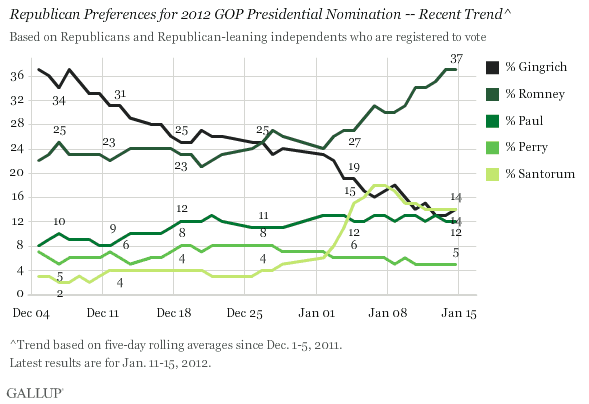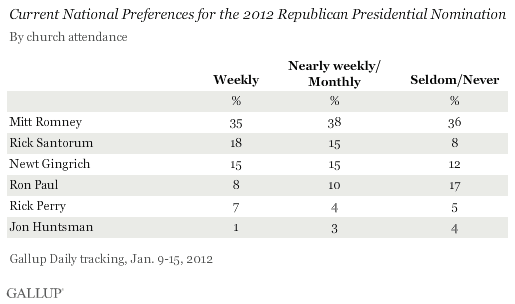PRINCETON, NJ -- Mitt Romney has climbed to a commanding 23-point lead over his nearest competitor among Republican registered voters nationally, based on interviewing conducted Jan. 11-15. Romney has 37% of the support of Republicans nationwide, while Rick Santorum and Newt Gingrich each have 14%, and Ron Paul has 12%. History suggests that Romney is now the probable favorite to win the Republican nomination.

Romney's current 37% support is tied for the highest enjoyed by any Republican candidate in Gallup Daily tracking of Republican preferences so far this election cycle, and marks a 13-percentage-point increase in support from his five-day average that ended Jan. 2, just before the Iowa caucuses.
As Romney's support has increased, support for his primary competitors has dropped. Santorum saw his support reach as high as 18% shortly after his strong showing in Iowa, but it has now settled back down to 14%. Gingrich's support had reached as high as 37% at two points in early December, but has now dropped by 23 points to 14%. Paul's support has been more consistent, and his current 12% is roughly where he has been over the past month. Rick Perry's support has languished in single digits since Gallup began daily tracking of the race on Dec. 1.
Former Utah Gov. Jon Huntsman's announcement on Monday that he is dropping out of the race and throwing his support to Romney most likely will have little impact on the race. Huntsman has been receiving only minimal support among Republicans nationally since Dec. 1, and his final five-day average support for Jan. 11-15 is 2%.
Gallup's analysis of historical trends indicates that ever since the nominations have been determined by voters in state primaries and caucuses rather than the national party conventions, the post-New Hampshire leader in the national polling of Republicans has gone on to win the GOP nomination. Romney is not only leading at this point, but his margin over his nearest competitor is growing and well above the 20-point threshold. It would be a historical anomaly if Romney did not go on from this point to win his party's nomination.
Santorum Does Better Among the Most Religious Republicans
Santorum over the weekend received the endorsement of a group of conservative Christian Republican leaders meeting in Texas. This endorsement is expected to help Santorum in this Saturday's South Carolina primary, given that South Carolina has the seventh-highest level of church attendance of any state in the union, according to Gallup Daily tracking conducted in 2009-2010. About 46% of Republicans and Republican leaners in South Carolina say they attend church weekly, well above the national average of 35%.
At the national level, Santorum does better among Republicans who are the most religious. He gets 18% of the support of Republicans who attend church weekly in Gallup's Jan. 9-15 average of GOP support, compared with 8% support among those who seldom or never attend. Santorum's relative strength among frequent churchgoers primarily comes at the expense of Paul and, to a lesser degree, Huntsman, and not front-runner Romney. Paul's support drops from 17% among those who seldom/never attend church to 8% among those who attend weekly, while Huntsman's support drops by three points between those who seldom or never attend and those who attend weekly. By contrast, Romney's support is roughly even across these two groups, with 36% support among those who seldom/never attend and 35% among those who attend weekly.

In short, Romney leads Santorum even among those who attend church weekly -- by 17 points.
Implications
Romney has moved to a 23-point lead over his nearest competitors among Republican registered voters nationally in Gallup tracking data collected after his victory in the New Hampshire primary last Tuesday. The trends in Romney's rising support provide evidence that rank-and-file Republicans across the country are beginning to coalesce around the former Massachusetts governor as their party's nominee.
Romney has been leading in polls conducted in South Carolina, which holds its primary this Saturday, Jan. 21. A victory there would most likely expand his national lead further because it would maintain his candidacy's aura of inevitability and because more of his competitors as a result would be likely to drop out of the race.
Survey Methods
Results are based on telephone interviews conducted as part of the Gallup Daily tracking survey Jan. 11-15, 2012, with a random sample of 1,195 Republicans and Republican-leaning independents who are registered to vote, aged 18 and older, living in all 50 U.S. states and the District of Columbia, selected using random-digit-dial sampling.
For results based on the total sample of Republican registered voters, one can say with 95% confidence that the maximum margin of sampling error is ±4 percentage points.
Interviews are conducted with respondents on landline telephones and cellular phones, with interviews conducted in Spanish for respondents who are primarily Spanish-speaking. Each sample includes a minimum quota of 400 cell phone respondents and 600 landline respondents per 1,000 national adults, with additional minimum quotas among landline respondents by region. Landline telephone numbers are chosen at random among listed telephone numbers. Cell phone numbers are selected using random-digit-dial methods. Landline respondents are chosen at random within each household on the basis of which member had the most recent birthday.
Samples are weighted by gender, age, race, Hispanic ethnicity, education, region, adults in the household, and phone status (cell phone only/landline only/both, cell phone mostly, and having an unlisted landline number). Demographic weighting targets are based on the March 2011 Current Population Survey figures for the aged 18 and older non-institutionalized population living in U.S. telephone households. All reported margins of sampling error include the computed design effects for weighting and sample design.
In addition to sampling error, question wording and practical difficulties in conducting surveys can introduce error or bias into the findings of public opinion polls.
For more details on Gallup's polling methodology, visit www.gallup.com.
